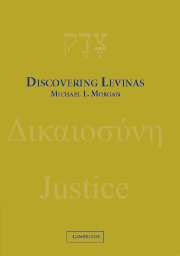Book contents
- Frontmatter
- Contents
- Preface
- Acknowledgments
- 1 Auschwitz, Politics, and the Twentieth Century
- 2 Phenomenology and Transcendental Philosophy
- 3 The Ethical Content of the Face-to-Face
- 4 Philosophy, Totality, and the Everyday
- 5 Meaning, Culture, and Language
- 6 Subjectivity and the Self
- 7 God and Philosophy
- 8 Time, Messianism, and Diachrony
- 9 Ethical Realism and Contemporary Moral Philosophy
- 10 Beyond Language and Expressibility
- 11 Judaism, Ethics, and Religion
- Conclusion: Levinas and the Primacy of the Ethical – Kant, Kierkegaard, and Derrida
- Appendix: Facing Reasons
- Bibliography
- Index
10 - Beyond Language and Expressibility
Published online by Cambridge University Press: 05 June 2012
- Frontmatter
- Contents
- Preface
- Acknowledgments
- 1 Auschwitz, Politics, and the Twentieth Century
- 2 Phenomenology and Transcendental Philosophy
- 3 The Ethical Content of the Face-to-Face
- 4 Philosophy, Totality, and the Everyday
- 5 Meaning, Culture, and Language
- 6 Subjectivity and the Self
- 7 God and Philosophy
- 8 Time, Messianism, and Diachrony
- 9 Ethical Realism and Contemporary Moral Philosophy
- 10 Beyond Language and Expressibility
- 11 Judaism, Ethics, and Religion
- Conclusion: Levinas and the Primacy of the Ethical – Kant, Kierkegaard, and Derrida
- Appendix: Facing Reasons
- Bibliography
- Index
Summary
Levinas uses the term “totality” to refer to a number of features of Western life and culture. It is the world that we, as thinkers and agents, live in and the sum of our ways of understanding, explaining, and organizing that world, culturally and intellectually. Central to totality, then, are the principles and concepts that we use to carry out these projects. In short, totality is the sum of thought and language as well as the world shaped by them.
“Infinity” and “transcendence” refer to what lie outside totality, in a sense, and yet those factors or actualities with which we, within totality, still engage. We have discussed the face, as the central fact of transcendence, and others, like illeity, the “there is,” and suffering, are central features of human existence, as Levinas sees it.
But if language is a function of totality, if our everyday discourse and our theoretical languages are part of our everyday lives, how can we speak about such factors as the face and illeity? Do they not lie beyond the limits of language and discourse, beyond expressibility? Levinas employs a large vocabulary to designate the face-to-face encounter, a vocabulary that develops and changes during his career – terms such as “epiphany,” “proximity,” “enigma,” “trauma,” “persecution,” and “accusation,” but how are these terms being used? Are they purely metaphorical? Is transcendence only graspable indirectly? Is the face ineffable? What kind of philosophy can deal with such transcendence, with what lies beyond language and indeed beyond thought?
- Type
- Chapter
- Information
- Discovering Levinas , pp. 300 - 335Publisher: Cambridge University PressPrint publication year: 2007



